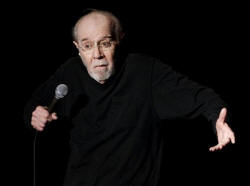 |
Other
News... sponsored by Richardson Repair & A-Plus Flooring |

 FBI didn't keep tabs on comedian Carlin's 7 words
FBI didn't keep tabs on comedian Carlin's 7 words
[January 22, 2009]
LOS ANGELES (AP)
--
Among the 12 pages in a file recently released by Carlin's family are a couple of letters from outraged citizens who complained that the comedian had made fun of the FBI and its director, J. Edgar Hoover, during TV appearances in 1969 and 1970.
|
There's also a letter from Hoover himself thanking one of Carlin's critics for defending his honor, and an internal FBI memo that quotes the director as asking: "What do we know of Carlin?" Not much, as it turned out. The memo notes the FBI has "no data concerning Carlin" other than the two letters from his critics. "Which kind of disappoints me," laughed Carlin's daughter, Kelly Carlin McCall, who provided the file to The Associated Press. "It doesn't really cover any of his more radical 1970s stuff." Carlin was arrested following a performance in Milwaukee in 1972 for saying the seven words (none of which can be reprinted here). The following year the Federal Communications Commission reprimanded New York radio station WBAI for airing his "filthy words" routine, triggering a legal battle that resulted in a landmark 1978 Supreme Court ruling upholding the government's right to determine indecency. Carlin, who died of a heart attack last June at 71, obtained the file years ago through a Freedom of Information Act request, McCall said. Richard Belzer read from some of it when Carlin was posthumously awarded the Mark Twain Prize for American Humor in a ceremony that will be broadcast on PBS stations Feb. 4. After Carlin's death, the FBI answered FOIA requests from the AP with a form letter saying the bureau had no file on him. FBI spokeswoman Laura Eimiller said this week she was checking on the contradiction. The two FBI memos Carlin's daughter provided both stated the bureau's files "contain no information identifiable with Carlin." They also indicate that investigators didn't find the comedian particularly amusing. One, dated Feb. 12, 1969, refers to Carlin as an "alleged comedian" after he made fun of the bureau during an appearance on "The Jackie Gleason Show." "His treatment was in very poor taste and it was obvious that he was using the prestige of the bureau and Mr. Hoover to enhance his performance," the memo says. It also quotes one segment during which Carlin says he is Hoover and is on a stakeout at the attorney general's house. The memo recommends the people who pointed out the performance be sent thank-you letters. The second memo, dated May 5, 1970, was triggered by a similar complaint, this time for a Carlin appearance on "The Carol Burnett Show." That time Hoover himself apparently sent the thank-you note, saying: "It's always good to know we have the support of such staunch friends as you." |

